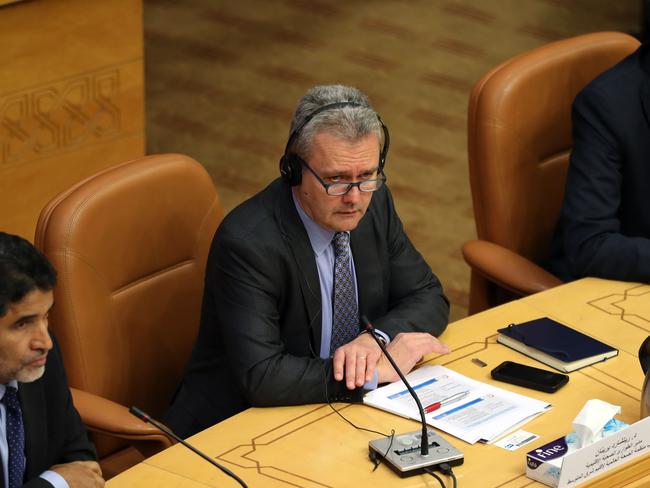Australian evacuees reveal coronavirus quarantine
Six Australians who were on board the Diamond Princess cruise ship have now tested positive for coronavirus, with concerns for more being screened today.
World
Don't miss out on the headlines from World. Followed categories will be added to My News.
Six Australians who were on board the Diamond Princess cruise ship have now tested positive for coronavirus, and that figure is expected to rise with another three patients to be screened on Saturday.
Two people from Victoria tested positive to the infection on Saturday and will be repatriated to their home state’s health system.
Two Queensland women aged 54 and 55 who tested positive on Friday night will be flown to a Brisbane hospital on Saturday for further treatment. The two women are not related.
The other confirmed cases were a man from Western Australia and a woman from South Australia.
A 78-year-old man from Western Australia was transferred to Sir Charles Gairdner Hospital in Perth on Friday. His wife was to travel with him but then be isolated at home for two weeks.
A 24-year-old woman from South Australia has been transferred to Royal Adelaide Hospital.
Under the evacuation deal, state governments agreed to treat any patients in their home states.
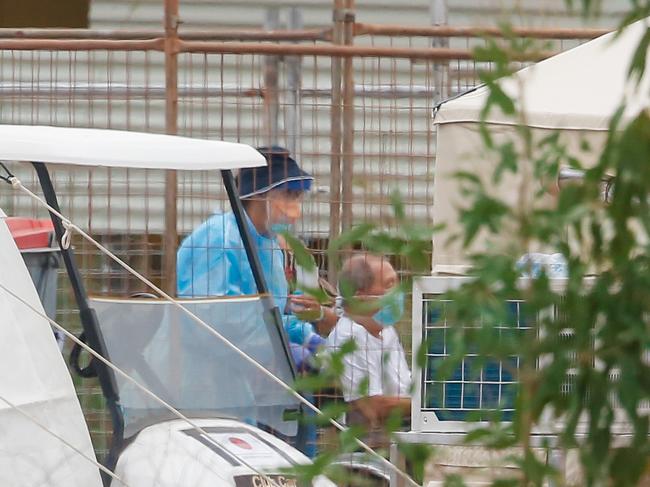
“We will continue to screen every day and to have that very precautionary approach to testing and ensuring that we are picking up early, and isolating early anybody who is positive for COVID-19,” says Dr Di Stevens Acting Chief Health Officer.
“We do have three people who are identified overnight that will be screened and tested.” Before the medical transfers she said they were “reasonably well” with a cough, sore throat, symptoms of a common cold.
A total of 164 Australian citizens and permanent residents were evacuated from the coronavirus-stricken Diamond Princess in Japan on Thursday, and flown to Darwin.
They are being kept separate from the 266 people who were already in quarantine at Howard Springs, who were evacuated earlier this month from the epicentre of the virus at Wuhan, the capital of China’s Hubei province.
They will leave on Sunday.
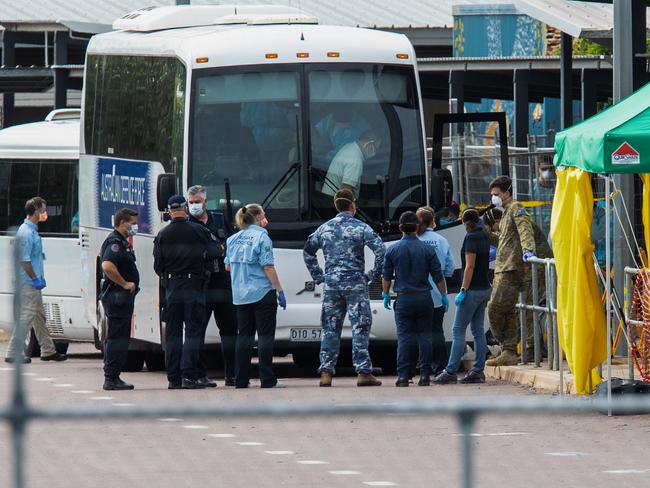
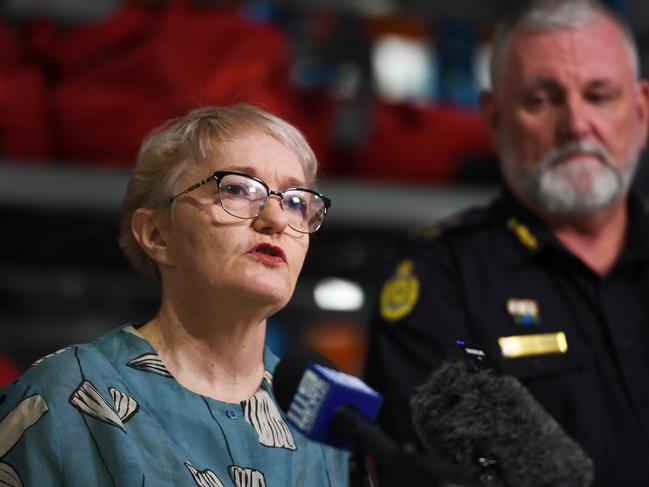
Melbourne couple Adina and Les Morris were sitting a row behind the 78-year-old man when he became ill during the flight to Darwin.
“He was right in front of us on the plane, they took his temperature when we landed in Darwin and he was rushed away,” Mrs Morris said.
“His temperature was obviously much higher than they wanted it to be.
“I’m very worried because we all tested negative before getting on the plane, after being in quarantine for 14 days on the ship – how on earth did he get it?
“Who knows how many of us have it now.
“To say this holiday has been a nightmare would be an understatement.”
CONCERN OVER INTERNATIONAL OUTBREAKS
The death toll from coronavirus now stands at 2239 as authorities grapple with reports of outbreaks in South Korea, Iran, the UAE, Egypt, Lebanon and Italy.
Dozens of people caught the virus in South Korea’s fourth-largest city, Daegu, in what authorities described as a “super-spreading event” at a church, bringing the nation’s case load to 104.
Meanwhile Italian officials announced 14 confirmed cases in the wealthy region of Lombardy and two in the adjacent region of Veneto.
There have been a total of 75,567 cases of the virus in China alone.
Meanwhile, one of the 11 Israelis who were flown home after being quarantined on the Diamond Princess has tested positive for coronavirus, the first case to be reported inside Israel, officials said Friday.
The woman carrying the virus is said to be “totally healthy” and not exhibiting any symptoms.
The head of the World Health Organization voiced concern on Friday about cases of coronavirus that have emerged outside China that do not have any links with the country at the source of the outbreak.
“Although the total number of COVID-19 cases outside remains relatively small, we are concerned about the number of cases with no clear epidemiological link, such as travel history to or contact with a confirmed case,” Tedros Adhanom Ghebreyesus said at a press conference in Geneva.

Ghebreyesus has for weeks insisted the low number of cases of COVID-19 outside the epicentre of the deadly outbreak in China’s central Hubei province presented a “window of opportunity” to contain the international spread.
But on Friday he said that while “we are still in a phase where containment is possible... our window of opportunity is narrowing.”
“That’s why we called (on) the international community to act quickly, including the financing,” he told reporters in Geneva.
INSIDE ‘CAMP QUARANTINE’
It is all quarantine and no play for the evacuees flown into Darwin from the Diamond Princess in Japan, with an Australian couple revealing all booze is off the table as it is an alcohol-free zone.
However, evacuees who are smokers are provided with free cigarettes – an option Kimberly Vincent does not think too fondly of.
The 73-year-old evacuee – being quarantined with her husband Ellis, 75 – told News Corp the Howard Springs facility had “their priorities wrong”.
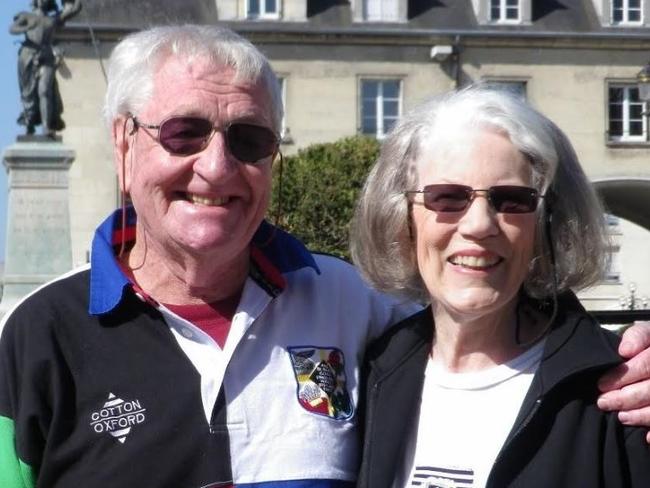
“If you don’t have the virus, we’ll help you to get lung cancer,” Mrs Vincent said, adding she was not impressed about an aircon issue, TV issues and having to clean cockroach poo off the counter in her single-bed room.
“It’s like a ’60s budget motel,” Mrs Vincent said. “It could be worse.
“The room has a TV, kettle, desk, chair, single bed, en suite, mini refrigerator, new-ish.
“There are still builders parts and debris left in the drawers.
“The TV goes out of commission when there’s a storm, which there is every afternoon and evening.”
However, not all is bad for Australians sectioned off from the rest of the country for the next 13 days.
Wi-Fi is available – if you ask – and meals are sufficient, with the first consisting of chicken curry for dinner, cheesecake and salad.
It is an upgrade from being confined on an aircraft with recycled airconditioning, where Mr and Mrs Vincent were with 162 other evacuees – seven of which are sick, with two testing positive for the deadly coronavirus on Friday.
“Keeping our fingers crossed that we don’t develop a temp nor cough,” she said.
“We shudder to think about the aircon system on the plane passing this virus through to all of us!”
EVACUEES CONSIDERED GREATER AT RISK
The latest evacuees are considered a greater risk of having coronavirus than people evacuated from Wuhan earlier this month.
News Corp learnt 10 Australians who were due to fly out ended up staying aboard the Diamond Princess.
The New Zealand Herald reports NZ’s Director General of Health Ashley Bloomfield said he understood the 10 Australians were with two Kiwis who were prevented from taking the Qantas plane to Darwin because they tested positive for the virus just before boarding.
“They were all prepared to board the flight, they just had a positive test,” Bloomfield said in a press conference late Thursday.
“So, I don’t think they were heavily symptomatic. They hadn’t presented with symptoms before they had the test.”
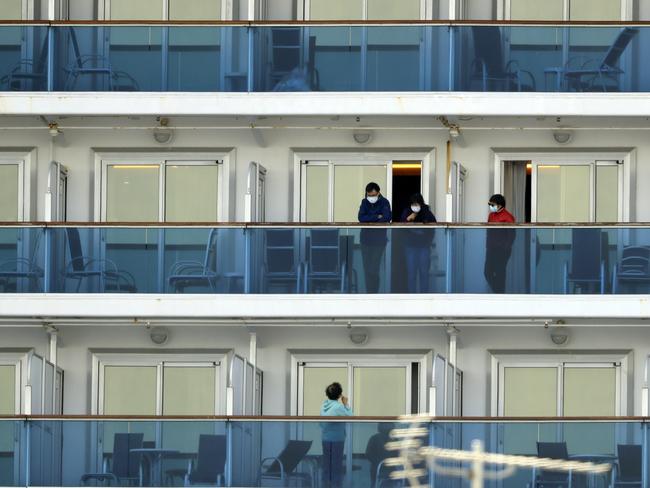
More than 600 of the 3700 passengers who were aboard the Diamond Princess have contracted the virus and many showed no symptoms when they tested positive.
Two passengers from the cruise ship, when quarantined in Japan, also died after contracting the coronavirus.
Both were Japanese – an 87-year-old man and an 84-year-old woman – Japanese broadcaster NHK reported.
They were taken to hospitals on February 11 and 12, and both had underlying health issues, the broadcaster said.
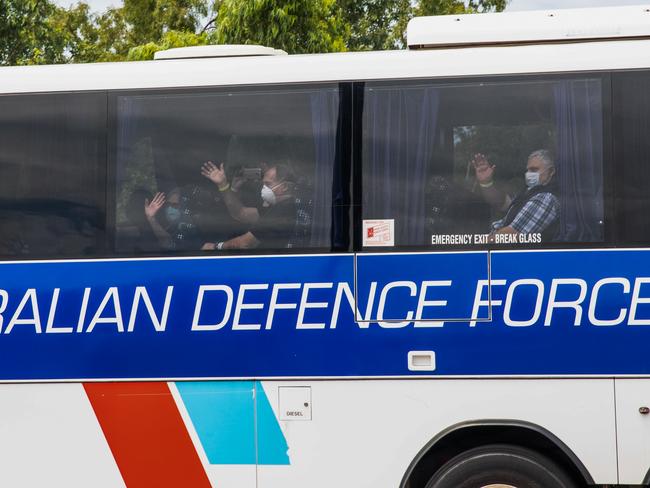
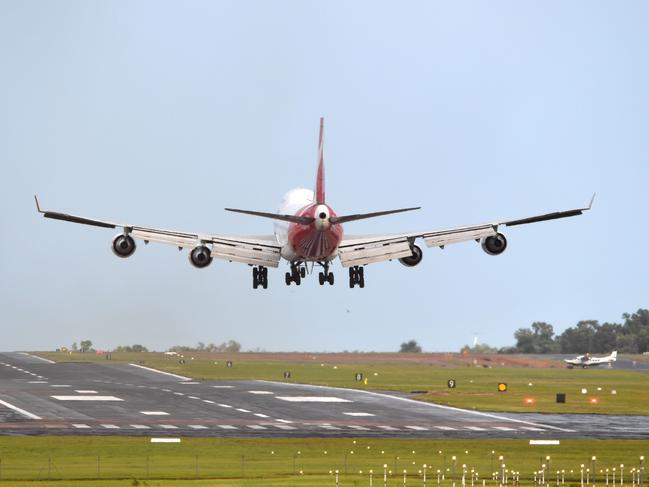
Melbourne mum Aun Na Tan, whose family was just a half-hour from disembarking the Diamond Princess when told daughter Kaitlyn Soh had tested positive to the virus, told News Corp: “We were pushing our luggage out and the phone rang so I had gone to pick it up.
“I was so stunned I could barely speak when they told us that Kaitlyn was positive.
“My husband knew as soon as he saw my face and asked who was positive.
“He ran outside to take our luggage in immediately after I pointed to Kaitlyn.”
The family, which also includes husband Jeff Soh and son Xander Soh, was waiting to be moved to a Japanese hospital.
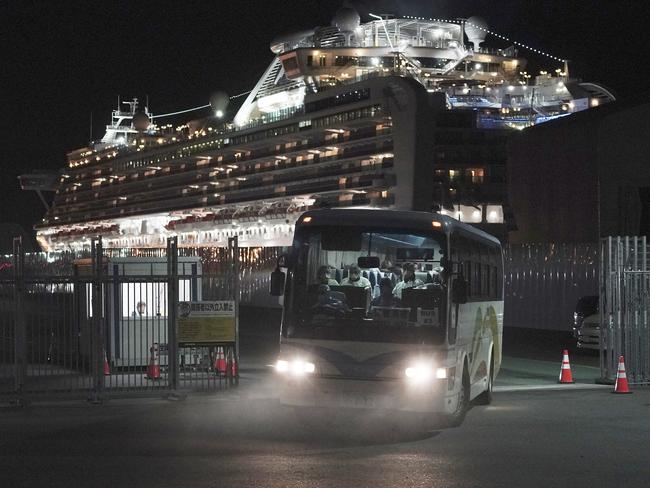
Kaitlyn, who celebrated her 16th birthday at the start of the cruise, had passed screening with Australian medical teams several hours before getting news of her test results.
“She was terrified at first,’’ Ms Tan said.
“Speaking to her and telling her she was healthy and young and she will be OK did little.
“But as we started speaking to family and friends – and repeating this over and over – it calmed her down.
“We insisted we want to stay together and they are therefore trying to find a hospital to take all four of us.
“She’s received so many lovely messages from her friends of encouragement – they really help.”
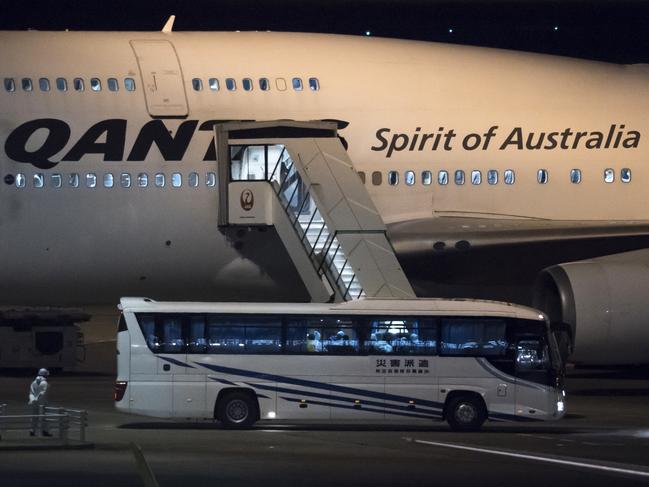
While many of the 266 people evacuated to Darwin from Wuhan on Sunday have praised the conditions at the Howard Springs workers’ camp, some of those arriving from the Diamond Princess did not share the view.
Melbourne retirees Adina and Les Morris said conditions in the village were primitive.
Mrs Morris, 74, said the couple were put in separate rooms which only had a single bed.
“It’s just a cubicle with a little window and that is all it is,’’ she said.
“This is a third world country here.
“I do not know what we are going to do here for 14 days.
“We are rationed for food and we have nothing in our rooms.”
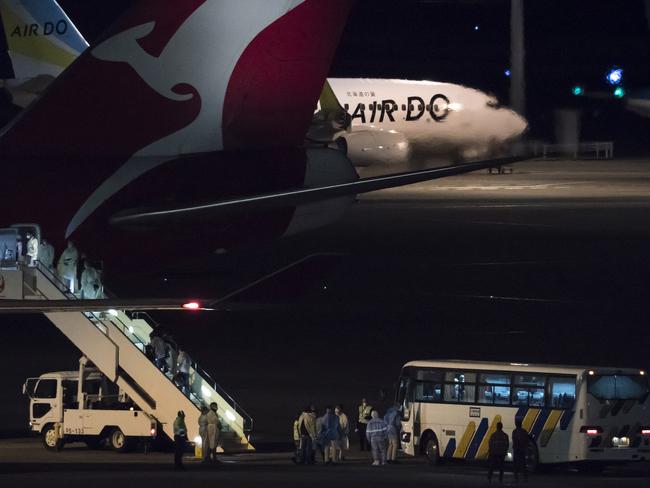
Mrs Morris said she was especially worried about sleeping apart from her 88-year-old husband who has a heart condition and sleep apnoea.
“Something could happen in the middle of the night and I wouldn’t know,’’ she said.
“I do not know what to do.
“It’s just horrific. I am so anxious.
“To live in these conditions for a fortnight for me is going to be impossible.
“This ship is luxurious.
“It’s like going from living in a castle in London to living in the backstreets.
“I am not exaggerating.”
ASIA-PACIFIC AIRLINES COULD LOSE $42 BILLION
Airlines operating in the Asia-Pacific region stand to lose a combined $US27.8 billion ($A42 billion) of revenue this year in the ongoing coronavirus crisis, the International Air Transport Association said.
The estimate is based on projections of a 13-per cent full-year decline in passenger demand, mostly in China, the trade body said.
“This will be a very tough year for airlines,” IATA CEO Alexandre de Juniac said in a statement. “Stopping the spread of the virus is the top priority.”
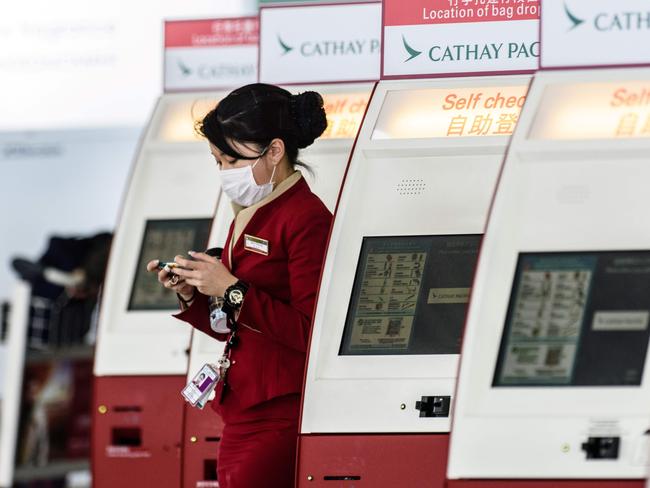
IATA said its estimate assumed that COVID-19 behaved like the SARS outbreak nearly two decades ago, which was “characterised by a six-month period with a sharp decline followed by an equally quick recovery”.
This will be the first time since the SARS crisis of 2003 that demand for air travel has declined, Mr De Juniac said.
Airlines in China’s domestic market alone are estimated to lose around $US12.8 billion in revenues.
IATA had previously estimated Asia-Pacific airlines to register growth of 4.8 per cent this year, but they are now on course instead for a contraction of 8.2 per cent, it said.
CHINA FINDS TRAVEL BAN LOOPHOLE
Chinese students enrolled in Australian universities but stuck on mainland China may still have the chance to attend class this year, despite the federal government’s coronavirus travel ban.
Travel agents in China have been marketing third country transit destination packages as a loophole around the ban, where non-Australian citizens and non-permanent residents from mainland China have to stop over in countries including Thailand, Malaysia and Cambodia before travelling to Australia.
The fourteen-day, thirteen-night packages – being micro-targeted on Chinese social media – are selling for as little as $2700 each, The Australian reports.
Ideas around the travel ban – preventing travellers from mainland China from entering Australia for 14 days – come just weeks after it was imposed by Scott Morrison on February 1.
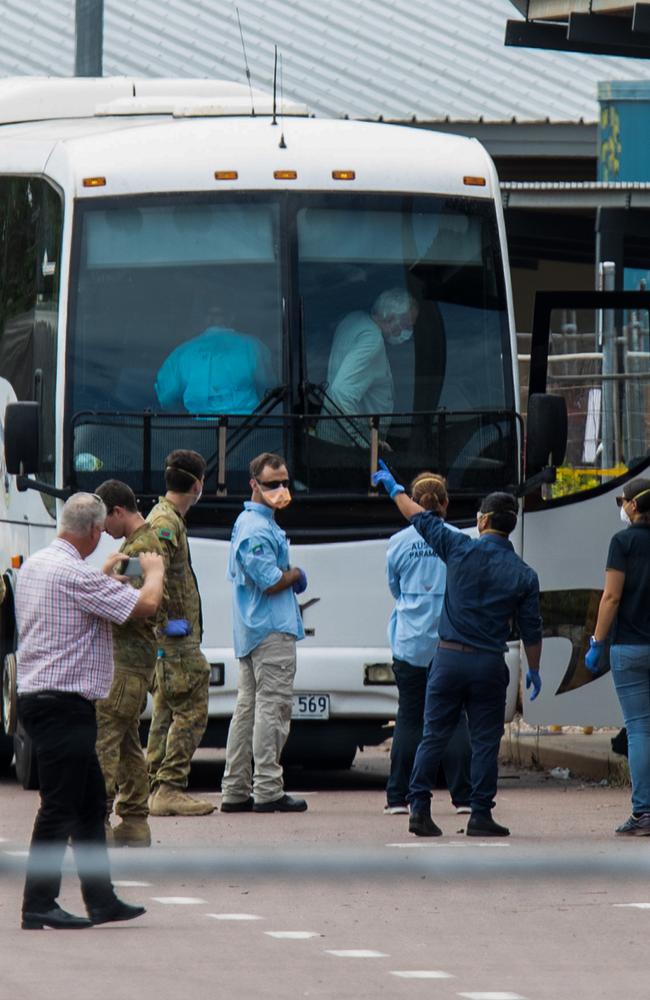
It was at a time when about two-thirds of the 109,000 Chinese students enrolled in Australia were in China for the Lunar New Year break.
Nick Coyle, Beijing-based executive director of business lobby AustCham China, told The Australian: “Chinese people, as we know, are very entrepreneurial, so it doesn’t surprise me an industry has popped up to work around the current regulations.”
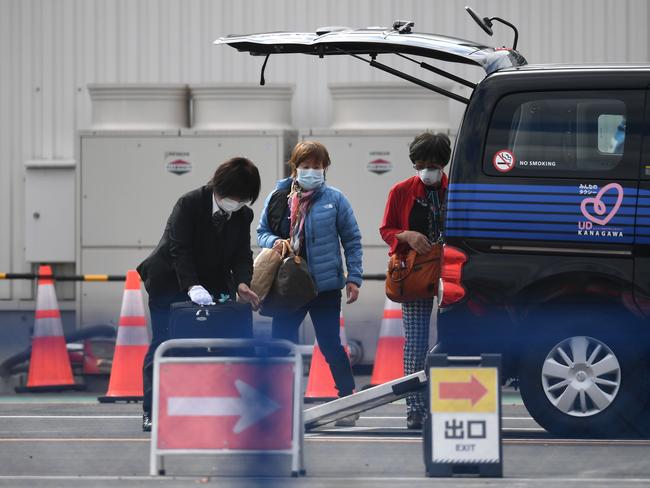
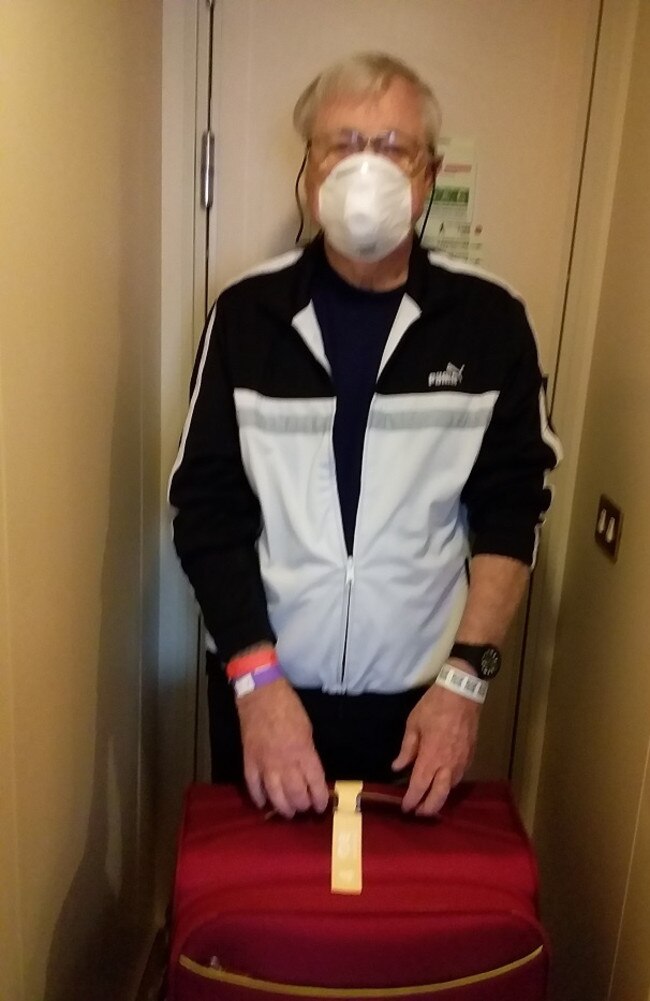

JAPAN SLAMMED FOR DIAMOND PRINCESS CRISIS
The Japanese government is under fire for mishandling the situation on board the Diamond Princess with claims the quarantine it enforced from February 5 was inadequate and chaotic.
An infectious diseases expert from Kobe University Hospital, Professor Kentaro Iwata, made a YouTube video that slams the operation.
He has placed himself in a self-imposed quarantine from his family after spending just one day on board with the Japanese disaster management team.
Professor Iwata said he was kicked off after making suggestions to better control the spread of infection.
“The bureaucrats were in charge of everything,” he said.
A statement from the US Centers for Disease Control and Protection also casts doubt on the effectiveness of the on-board quarantine.
“It may not have been sufficient to prevent transmission,” the statement reads.
It goes on to explain that the 100 Americans remaining on board will be placed on travel restrictions preventing them from returning to the US for at least two weeks after disembarking.
The Diamond Princess represents the largest outbreak cluster outside China.
The number of cases in Japan, separate to the ship, is about 70 and increasing daily.
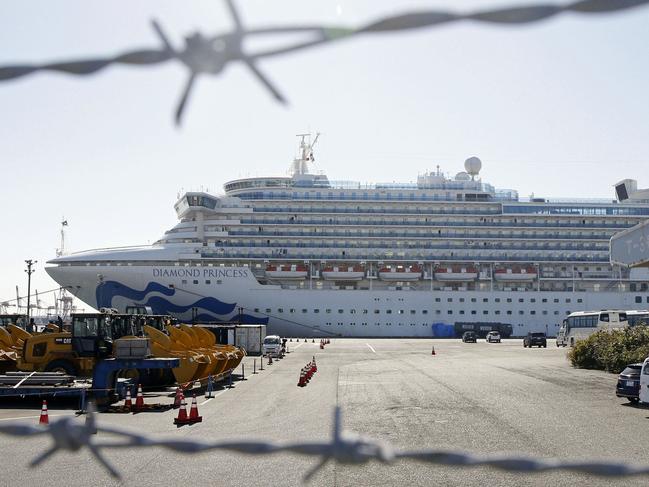
TOP AUSSIE UNIS FACE $1.2B HIT
Exclusive analysis by The Australian of the Group of Eight universities — plus the University of Technology Sydney and RMIT — has revealed that more than 60 per cent of an estimated 109,000 Chinese students enrolled in first-semester courses are still in China.
The Centre for independent Studies, a free-market think tank, has conducted an analysis showing the fallout from the epidemic could wipe as much as $12bn from the nation’s export earnings.
The report’s author, Salvatore Babones, singled out the Tertiary Education Quality and Standards Agency for “massive failure” of oversight and warned it was “inherently risky” to build a business around education exports to citizens of “a totalitarian police state”.
The study concluded that more than 40 per cent of education exports to China — worth $12.1bn last year — could evaporate, even if the coronavirus epidemic is contained by June.
Meanwhile, the Australian National University — which has about 4000 of its estimated 5000 Chinese students stuck in China — is the first Australian university to offer free online courses for those unable to make it to campus by the end of March, The Australian reports.
